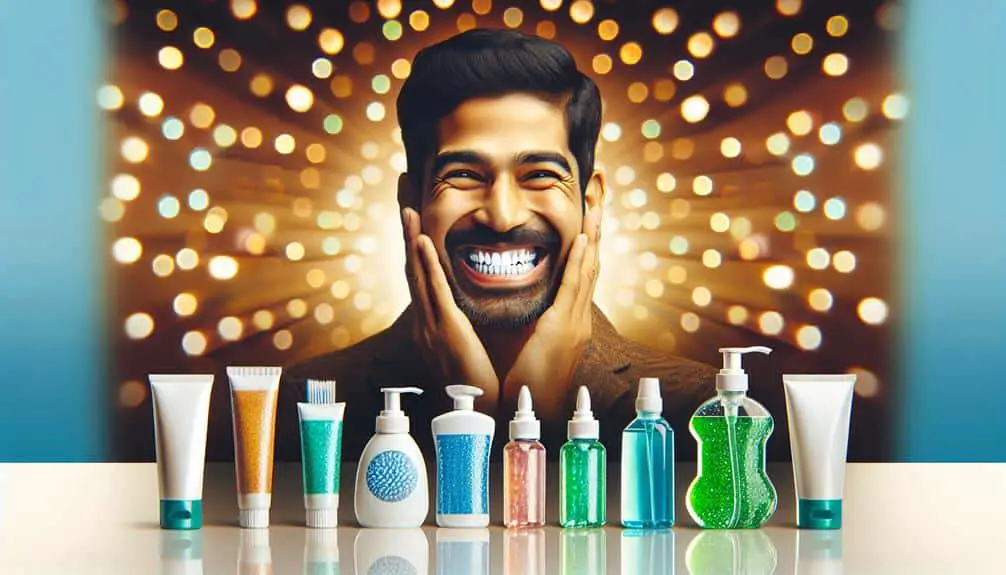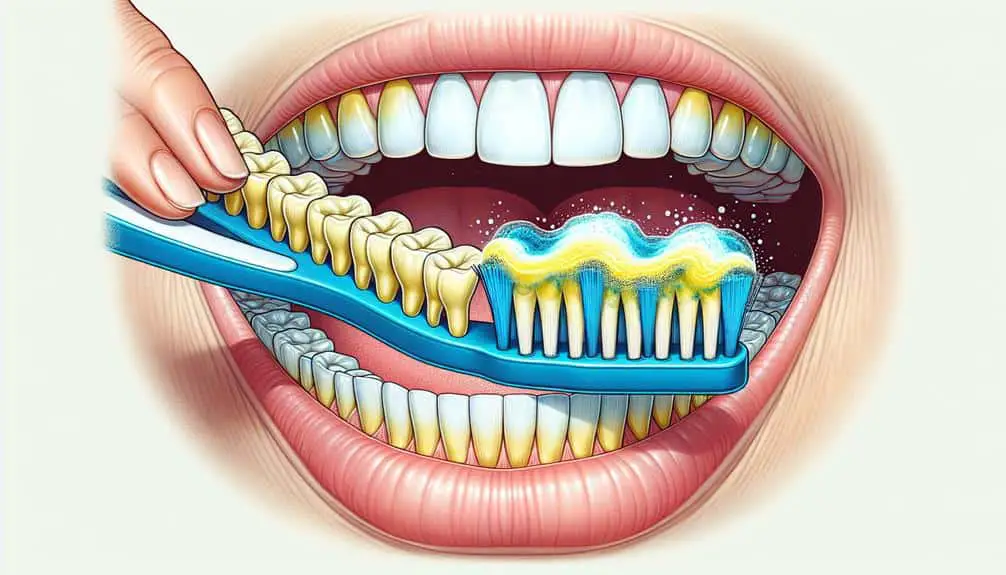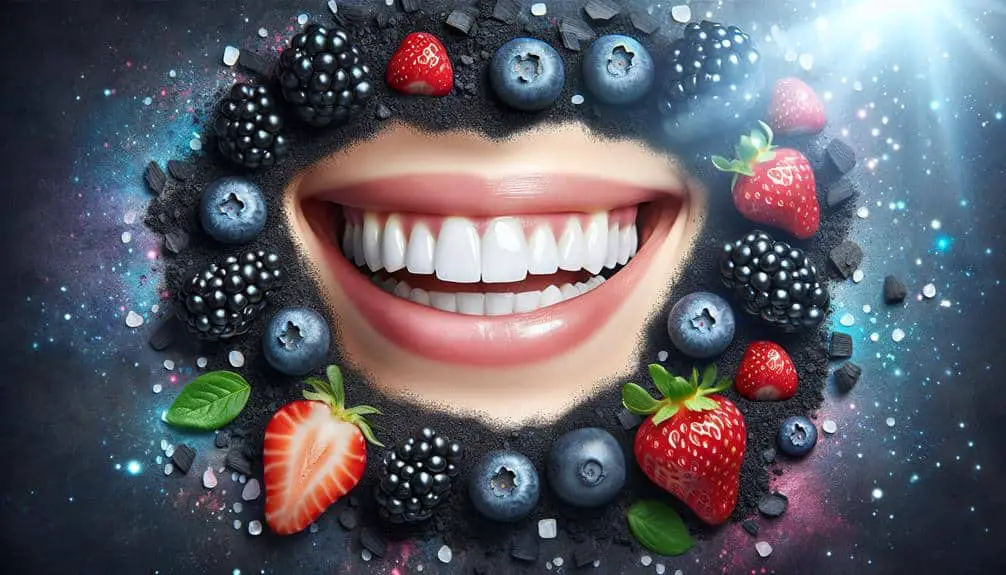To keep your teeth stain-free, opt for fluoride-free toothpaste with natural ingredients. Regular dental check-ups aid in early detection and thorough cleaning. Limit stain-causing beverages and choose foods like apples and carrots. Use a soft-bristled toothbrush at a 45-degree angle, floss daily, and brush with fluoride mouthwash. Finally, consider professional whitening treatments for long-lasting results. Prioritize dental health to protect your enamel and maintain a brighter smile. Other effective tips can further enhance your oral care routine.
Key Points
- Use fluoride-free toothpaste for stain prevention.
- Schedule regular dental check-ups for oral health maintenance.
- Limit consumption of staining beverages like coffee and tea.
- Follow proper brushing techniques with a soft-bristled brush.
- Consider professional whitening treatments for long-lasting results.
Importance of Fluoride-Free Toothpaste
To maintain stain-free teeth, consider using fluoride-free toothpaste for a gentler and more natural approach to oral hygiene. Fluoride-free toothpaste offers numerous benefits, especially for individuals looking for alternatives to traditional toothpaste.
By opting for fluoride-free options, you can prevent potential risks associated with excessive fluoride intake, such as dental fluorosis in children or fluoride toxicity in adults. These toothpaste alternatives are formulated with natural ingredients that are effective in cleaning your teeth without the use of fluoride.
Prevention is key when it comes to oral health, and fluoride-free toothpaste can help you maintain a healthy smile without the added risks. Many fluoride-free toothpaste brands contain ingredients like baking soda, charcoal, or essential oils that aid in removing surface stains and preventing new ones from forming.
Regular Dental Check-ups
Regular dental check-ups are crucial in maintaining outstanding oral health and preventing potential issues. Proactive care is essential to keeping your teeth free of stains. Consistent visits to your dentist not only aid in the early detection of any dental problems but also play a significant role in your overall dental hygiene.
During these examinations, your dentist will thoroughly clean your teeth, removing any plaque or tartar buildup that can lead to stains. They'll also be able to offer personalized advice on how to enhance your oral hygiene routine to avoid future staining.
Furthermore, dental check-ups often involve screenings for oral cancer, gum disease, and other possible oral health issues. Early identification of these problems can assist in preventing them from worsening and causing additional harm. By remaining vigilant with your dental care, you can guarantee that your teeth stay healthy, radiant, and free from stains.
Keep in mind, prevention is always superior to treatment when it comes to maintaining a stain-free smile.
Limit Staining Beverages
Consider cutting back on beverages that are known to cause stains on your teeth to maintain a brighter smile. Here are some practical tips to help you limit staining beverages and keep your teeth looking their best:
- Limiting Coffee, Tea, and Soda: These beverages are notorious for causing teeth stains due to their high levels of chromogens, compounds that easily attach to the enamel of your teeth, leading to discoloration over time. If you can't entirely eliminate them from your diet, consider reducing your consumption and using a straw to minimize contact with your teeth.
- Choosing Stain-Resistant Foods: Opting for foods that are naturally stain-resistant can help protect your teeth from discoloration. Crunchy fruits and vegetables like apples, carrots, and celery can act as natural scrubbers, helping to remove surface stains and plaque that can lead to discoloration.
- Rinsing with Water: After consuming staining beverages or foods, rinse your mouth with water to help prevent the pigments from sticking to your teeth. This simple habit can go a long way in maintaining a brighter smile and reducing the risk of stains.
Proper Brushing Techniques
Maintaining proper brushing techniques is vital for keeping your teeth healthy and free from stains. To start, make sure you're using a soft-bristled toothbrush to prevent enamel damage. Hold the brush at a 45-degree angle and use gentle, circular motions to clean all surfaces of your teeth. Don't forget to brush your tongue to remove bacteria that can cause discoloration.
In addition to brushing, incorporating flossing into your daily routine is essential for preventing stains between teeth. Use a gentle back-and-forth motion to remove plaque and food particles that brushing alone can't reach. This helps in preventing the buildup of substances that can lead to yellowing and discoloration.
Furthermore, consider using a mouthwash containing fluoride to strengthen enamel and protect against stains. Mouthwash reaches areas that brushing might miss, providing an extra layer of defense against discoloration.
Professional Whitening Treatments
For professional whitening treatments, consult with your dentist to explore effective options tailored to your teeth's specific needs. Here are three key points to keep in mind:
- Customized Treatment Plan: Your dentist will assess your teeth and provide a personalized whitening plan, taking into account factors like enamel health, existing stains, and sensitivity. This personalized approach guarantees that the treatment aligns with your dental needs, optimizing results while minimizing potential side effects.
- Long-Term Results: Professional whitening treatments offer more enduring results compared to at-home remedies. The specialized bleaching agents used in these treatments penetrate deeper into the enamel, delivering a more thorough whitening effect that lasts longer. This longevity can help maintain a bright smile over an extended period.
- Sensitive Teeth Care: If you have sensitive teeth, your dentist can adjust the whitening process to minimize discomfort while still achieving effective results. They may use techniques like desensitizing agents or lower-concentration bleaching agents to ensure a comfortable experience without compromising the whitening outcome. Prioritizing your dental health throughout the whitening process helps protect your enamel and maintain overall oral wellness.
Frequently Asked Questions
Can Using Whitening Toothpaste Prevent Teeth Stains?
Using whitening toothpaste can help prevent teeth stains by removing surface stains. However, to truly combat discoloration, focus on dietary habits and lifestyle choices. Avoiding staining foods and drinks, along with regular dental care, are key preventive measures.
How Often Should I Replace My Toothbrush to Prevent Stains?
To prevent stains, replace your toothbrush every 3-4 months or sooner if bristles fray. Use proper brushing techniques, quality toothbrush, and floss daily. Diet impacts stain prevention. Regularly replacing your toothbrush is a simple step for maintaining a bright smile.
Are There Any Natural Remedies That Can Help Prevent Teeth Stains?
You can maintain a vibrant smile by embracing a diet rich in fruits and vegetables. Natural remedies like baking soda or coconut oil pulling can aid in preventing teeth stains. Adjusting lifestyle choices can lead to stain-free teeth.
Can Certain Medications Contribute to Teeth Staining?
Certain medications can contribute to teeth staining. Maintaining good dental hygiene by brushing and flossing regularly is crucial. Stain causes include factors like coffee and smoking. To prevent stains, limit intake of staining substances and schedule regular cleanings with your dentist.
Is There a Connection Between Teeth Stains and Overall Dental Health?
Teeth stains can reflect overall dental health. Your diet impacts enamel, and lifestyle habits like smoking can lead to discoloration. Regular dental visits, proper oral hygiene, and avoiding stain-causing foods and drinks help maintain a bright smile.



